Author Peggy Seeger
Freight Train
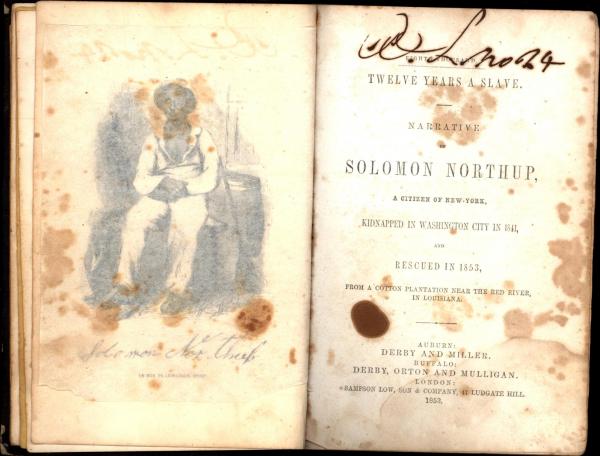
Freight train, freight train run so fast
(Continues)
(Continues)
Contributed by Bernart Bartleby 2022/1/7 - 13:38
Song Itineraries:
Racism and Slavery in the USA
Che Guevara
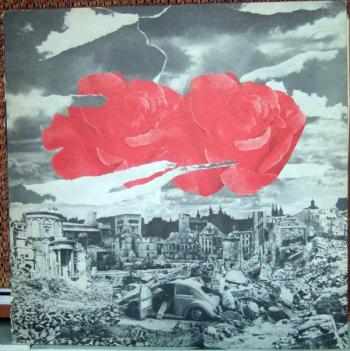
The hunt is over, the hounds are weary
(Continues)
(Continues)
Contributed by Dq82 2021/4/10 - 19:28
Song Itineraries:
Che Guevara
Extinction Rebellion! Right Now! Right Here!

2019
EXTINCTION REBELLION! say it loud and clear
(Continues)
(Continues)
Contributed by Dq82 2021/4/10 - 19:21
We Remember (Naming of Names)
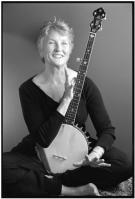
2018
I have written political songs for half a century. I’m very proud of this one, commemorating political activists of all sorts who have given up their lives or their freedom for their beliefs. It was recorded circa 1988 and is sung here by my partner, Irene Pyper-Scott and our 1980s women’s chorus, Jade.
I have written political songs for half a century. I’m very proud of this one, commemorating political activists of all sorts who have given up their lives or their freedom for their beliefs. It was recorded circa 1988 and is sung here by my partner, Irene Pyper-Scott and our 1980s women’s chorus, Jade.
Name the comrades
(Continues)
(Continues)
Contributed by Dq82 2021/4/10 - 19:09
Song Itineraries:
Apartheid, Institutionalized Racist Shame, Víctor Jara
Lullabies for Strangers
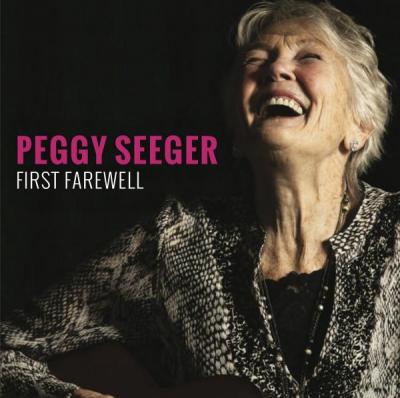
2021
The First Farewell
Words & music Peggy Seeger & Kate St. John
First Farewell è un titolo volutamente giocoso per il 24° album solista di Peggy Seeger. Allude alla canzone che il suo defunto marito Ewan MacColl ha scritto per lei, The First Time Ever I Saw Your Face, e il modo in cui ride sulla copertina, i suoi occhi al cielo, suggerisce che non ha ancora finito alla tenera età di 85 anni.
Apparentemente è il suo ultimo album di inediti, scritto e registrato con la sua famiglia (i figli musicisti Calum e Neill MacColl e la compagna di Neill, la compositrice Kate St John).
The First Farewell
Words & music Peggy Seeger & Kate St. John
First Farewell è un titolo volutamente giocoso per il 24° album solista di Peggy Seeger. Allude alla canzone che il suo defunto marito Ewan MacColl ha scritto per lei, The First Time Ever I Saw Your Face, e il modo in cui ride sulla copertina, i suoi occhi al cielo, suggerisce che non ha ancora finito alla tenera età di 85 anni.
Apparentemente è il suo ultimo album di inediti, scritto e registrato con la sua famiglia (i figli musicisti Calum e Neill MacColl e la compagna di Neill, la compositrice Kate St John).
I live in a room in the grey country
(Continues)
(Continues)
Contributed by Dq82 2021/4/10 - 18:51
Song Itineraries:
The War of Labour: Emigration, Immigration, Exploitation, Slavery
Unnamed (the Donald Trump Song)
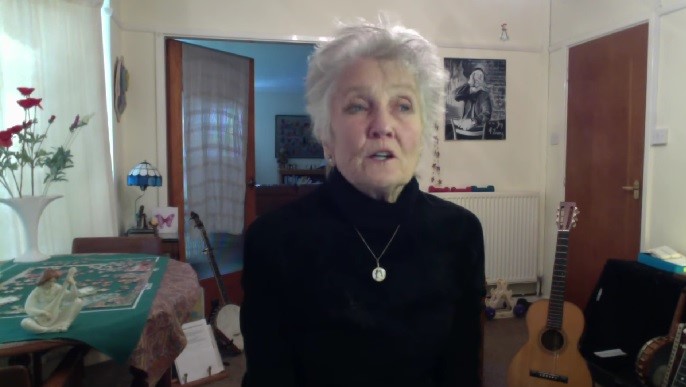
2020
This song has not been published, and so is unnamed. Seeger sang it on a "Peggy at 5 on Sunday" live stream on her Youtube Channel May 10th 2020. It was made to existing tune and format - a British children's scatalogical song.
This song has not been published, and so is unnamed. Seeger sang it on a "Peggy at 5 on Sunday" live stream on her Youtube Channel May 10th 2020. It was made to existing tune and format - a British children's scatalogical song.
"It's about a person we'd all like to forget about, but it's rather difficult" Seeger says of the song in the live stream.
Donald's in the white house with his bunch of tricks
(Continues)
(Continues)
Contributed by Keam 2020/7/19 - 12:22
Song Itineraries:
Donald Trump
Peggy Seeger: The First Time Ever I Saw Your Face

Irish transcreation by Gabriel Rosenstock of Johnny Cash cover
AN CHÉAD UAIR
(Continues)
(Continues)
Contributed by Gabriel Rosenstock 2018/7/27 - 15:50
Trafford Road Ballad
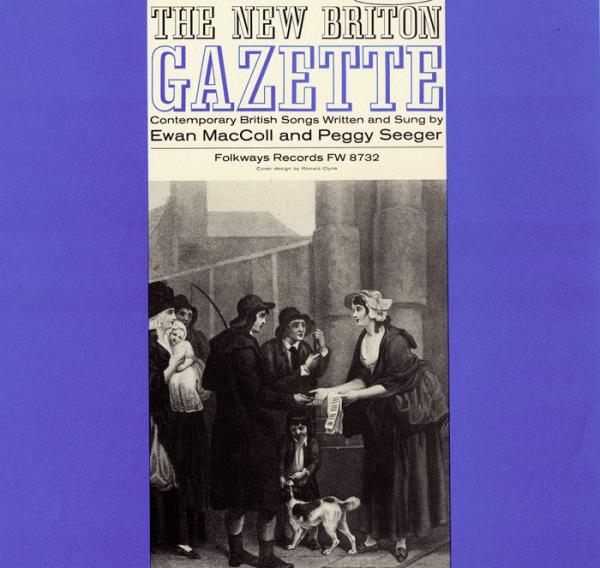
[1948]
Parole e musica di Ewan MacColl
Nel disco “New Briton Gazette, Vol. 1” (Folkways, 1960), con Peggy Seeger
Testo trovato su libretto del disco.
Una canzone scritta da MacColl per lo spettacolo teatrale “Landscape with Chimneys”, andato in scena nel 1951.
Trafford Road a Salford è la strada che la lambisce la Central Bay di Manchester con i suoi docks, attraversando il fiume Irwell tra Gnome Island e Pomona…
Il Mark .303 è un famoso fucile di costruzione inglese, prodotto a partire dal 1889 e fino ad oggi.
Parole e musica di Ewan MacColl
Nel disco “New Briton Gazette, Vol. 1” (Folkways, 1960), con Peggy Seeger
Testo trovato su libretto del disco.
Una canzone scritta da MacColl per lo spettacolo teatrale “Landscape with Chimneys”, andato in scena nel 1951.
Trafford Road a Salford è la strada che la lambisce la Central Bay di Manchester con i suoi docks, attraversando il fiume Irwell tra Gnome Island e Pomona…
Il Mark .303 è un famoso fucile di costruzione inglese, prodotto a partire dal 1889 e fino ad oggi.
I've never been out of Salford town
(Continues)
(Continues)
Contributed by Bernart Bartleby 2018/5/11 - 11:05
Come Fill Up Your Glasses
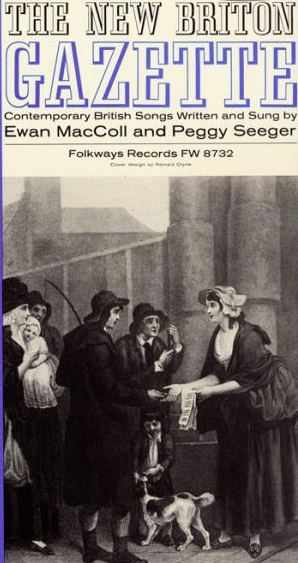
[1960]
Parole di Peggy Seeger, sulla melodia di una tradizionale drinking song
Nel disco “New Briton Gazette, Vol. 1” (Folkways, 1960), con Ewan MacColl
Testo trovato su libretto del disco.
Parole di Peggy Seeger, sulla melodia di una tradizionale drinking song
Nel disco “New Briton Gazette, Vol. 1” (Folkways, 1960), con Ewan MacColl
Testo trovato su libretto del disco.
Come fill up your glasses with whiskey and beer
(Continues)
(Continues)
Contributed by Bernart Bartleby 2018/5/11 - 09:57
Ballad of the Carpenter

[1955]
Parole e musica di Ewan MacColl
Nel disco “New Briton Gazette, Vol. 1” (Folkways, 1960), con Peggy Seeger
Testo trovato su libretto del disco.
Echi di Jesus Christ di Woody Guthrie. Interpretata anche da Phil Ochs nel suo disco I Ain't Marching Anymore del 1965.
Parole e musica di Ewan MacColl
Nel disco “New Briton Gazette, Vol. 1” (Folkways, 1960), con Peggy Seeger
Testo trovato su libretto del disco.
Echi di Jesus Christ di Woody Guthrie. Interpretata anche da Phil Ochs nel suo disco I Ain't Marching Anymore del 1965.
Jesus was a working man, a hero as you shall hear
(Continues)
(Continues)
Contributed by Bernart Bartleby 2018/5/11 - 09:22
The Dead Men

[1968]
Parole di Peggy Seeger, su di una melodia tradizionale scozzese
Nel disco “At The Present Moment” (1973), con Ewan MacColl
Testo trovato su Mudcat Café
Parole di Peggy Seeger, su di una melodia tradizionale scozzese
Nel disco “At The Present Moment” (1973), con Ewan MacColl
Testo trovato su Mudcat Café
The rain runs down through London town, like tears the rain does fall
(Continues)
(Continues)
Contributed by Bernart Bartleby 2018/5/7 - 11:11
Tall and Proud

[1970]
Parole di Ewan MacColl su melodia tradizionale ("Lynchburg Town")
Nel disco “At The Present Moment” (1973), con Peggy Seeger
Testo trovato su Mudcat Café
Una canzone che mi pare molto significativa e che finora c’era sfuggita… “Il bianco arruola il nero per combattere il giallo, per difendere la terra che ha rubato al rosso...”
Parole di Ewan MacColl su melodia tradizionale ("Lynchburg Town")
Nel disco “At The Present Moment” (1973), con Peggy Seeger
Testo trovato su Mudcat Café
Una canzone che mi pare molto significativa e che finora c’era sfuggita… “Il bianco arruola il nero per combattere il giallo, per difendere la terra che ha rubato al rosso...”
Our boys are standing tall out there
(Continues)
(Continues)
Contributed by Bernart Bartleby 2018/5/7 - 11:02
Song Itineraries:
Racism and Slavery in the USA, War in Viet Nam as seen from the U.S.
White Wind
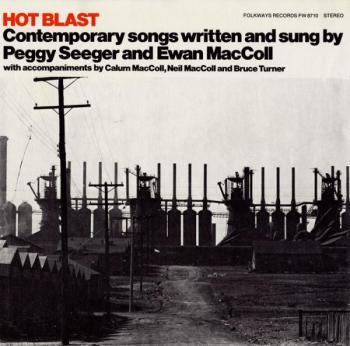
[1960?]
Parole e musica di Ewan MacColl
Cinque canzoni che formano quasi un poema epico sulla conquista e la dominazione del Sudafrica da parte di olandesi e britannici e sulla lotta di liberazione dei nativi. Il brano fu in gran parte composto da MacColl dopo il massacro di Sharpeville del marzo 1960 (cui l’autore dedicò anche un’altra canzone, The Ballad of Sharpeville) ma fu registrato solo parecchi anni dopo nell’album “Hot Blast” del 1978. Quindi in una significativa compilation del 1986 intitolata “White Wind, Black Tide”, con Peggy Seeger. Raramente eseguita dal vivo, di certo per la sua lunghezza e complessità.
Parole e musica di Ewan MacColl
Cinque canzoni che formano quasi un poema epico sulla conquista e la dominazione del Sudafrica da parte di olandesi e britannici e sulla lotta di liberazione dei nativi. Il brano fu in gran parte composto da MacColl dopo il massacro di Sharpeville del marzo 1960 (cui l’autore dedicò anche un’altra canzone, The Ballad of Sharpeville) ma fu registrato solo parecchi anni dopo nell’album “Hot Blast” del 1978. Quindi in una significativa compilation del 1986 intitolata “White Wind, Black Tide”, con Peggy Seeger. Raramente eseguita dal vivo, di certo per la sua lunghezza e complessità.
I
(Continues)
(Continues)
Contributed by Bernart Bartleby 2018/5/4 - 08:32
Song Itineraries:
Apartheid, Institutionalized Racist Shame
The Invader

[1978]
Parole e musica di Peggy Seeger
Nell’album “Hot Blast”, con Ewan MacColl
Una canzone contro il nucleare, civile e militare…
Parole e musica di Peggy Seeger
Nell’album “Hot Blast”, con Ewan MacColl
Una canzone contro il nucleare, civile e militare…
On the first six days we lived in trees,
(Continues)
(Continues)
Contributed by Bernart Bartleby 2018/5/3 - 14:43
Song Itineraries:
No Nukes
Emily

[1978]
Parole e musica di Peggy Seeger
Nell’album “Hot Blast”, con Ewan MacColl
“This song is based on the experience of a woman who spent eighteen months in a battered wives’ refuge in south London, awaiting the decision of the courts and the council to rehouse her.” (Peggy Seeger)
Parole e musica di Peggy Seeger
Nell’album “Hot Blast”, con Ewan MacColl
“This song is based on the experience of a woman who spent eighteen months in a battered wives’ refuge in south London, awaiting the decision of the courts and the council to rehouse her.” (Peggy Seeger)
Once we were single, once we were young
(Continues)
(Continues)
Contributed by Bernart Bartleby 2018/5/3 - 14:03
Song Itineraries:
Violence on Women: just like and worse than war
Blast Against Blackguards (or Some Cautionary Verses Against the Vile Villains Who Would Take Freedom From Its Rightful Owners)

[1978]
Parole e musica di Ewan MacColl
Nell’album “Hot Blast”, con Peggy Seeger
Canzone senz’altro un po’ prolissa (d’altra parte il buon MacColl era già oltre i sessanta…) ma efficace nel descrivere in modo ironico ed amaro il sistema “liberale” britannico, che nel 1978 (l’anno del cosiddetto “Inverno dello Scontento”, con un governo laburista in piena crisi) volgeva ormai verso il conservatorismo thatcheriano e la sua macelleria sociale...
Parole e musica di Ewan MacColl
Nell’album “Hot Blast”, con Peggy Seeger
Canzone senz’altro un po’ prolissa (d’altra parte il buon MacColl era già oltre i sessanta…) ma efficace nel descrivere in modo ironico ed amaro il sistema “liberale” britannico, che nel 1978 (l’anno del cosiddetto “Inverno dello Scontento”, con un governo laburista in piena crisi) volgeva ormai verso il conservatorismo thatcheriano e la sua macelleria sociale...
We have always treasured freedom in this country
(Continues)
(Continues)
Contributed by Bernart Bartleby 2018/5/3 - 12:50
Song Itineraries:
The War of Labour: Emigration, Immigration, Exploitation, Slavery
We Poor Labouring Men
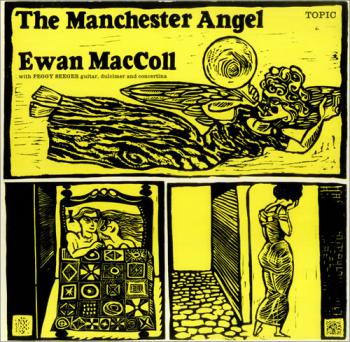
[fine 800 / inizio 900]
Una ballata tradizionale che Ewan MacColl apprese nei primi anni 60 da una traveller, una zingara inglese di nome Queen Caroline Hughes
Negli album “The Manchester Angel” (1966) e “Traveller's Songs from England and Scotland” (1977), con Peggy Seeger
Interpretata anche da Steeleye Span e altri artisti inglesi
Testo trovato su Mainly Norfolk: English Folk and Other Good Music
Una ballata tradizionale che Ewan MacColl apprese nei primi anni 60 da una traveller, una zingara inglese di nome Queen Caroline Hughes
Negli album “The Manchester Angel” (1966) e “Traveller's Songs from England and Scotland” (1977), con Peggy Seeger
Interpretata anche da Steeleye Span e altri artisti inglesi
Testo trovato su Mainly Norfolk: English Folk and Other Good Music
Now some do say the weaver's best but I would not say so
(Continues)
(Continues)
Contributed by Bernart Bartleby 2018/4/20 - 11:25
Song Itineraries:
The War of Labour: Emigration, Immigration, Exploitation, Slavery
The Grocer
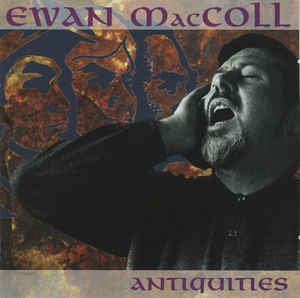
1998
Antiquites
On the tune "The Garden Where the Praties Grow"
Peggy Seeger's Notes: Ewan had an odd attitude towards grocers. It might have been due to his own poverty- stricken childhood when his family was continually in debt to the local grocer; or perhaps it was the rumour that the present royal family can be traced back to a grocer who made his fortune by victualling Napoleon armies...no matter. Margaret Thatcher's father was a grocer and Ewan wasn't about to let her forget it.
Testo trovato su mudcat.org
Antiquites
On the tune "The Garden Where the Praties Grow"
Peggy Seeger's Notes: Ewan had an odd attitude towards grocers. It might have been due to his own poverty- stricken childhood when his family was continually in debt to the local grocer; or perhaps it was the rumour that the present royal family can be traced back to a grocer who made his fortune by victualling Napoleon armies...no matter. Margaret Thatcher's father was a grocer and Ewan wasn't about to let her forget it.
Testo trovato su mudcat.org
Come all you argumentative sods who like to chew the rag,
(Continues)
(Continues)
Contributed by Dq82 2018/3/30 - 21:57
Song Itineraries:
Miss Maggie Thatcher
Hughie Grame
Anonymous
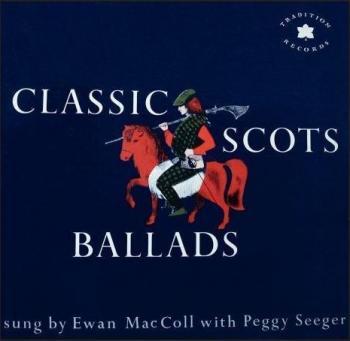
(Child #191)
[XVI° secolo?]
Una ballata tradizionale di origine scozzese che Francis James Child riporta in sei o sette versioni (quella che propongo è la prima) nella sua raccolta “The English and Scottish Popular Ballads” (1882-1898), ma che si trova già nel “Minstrelsy of the Scottish Border” di Sir Walter Scott (1802-1803)
Ripresa da Ewan MacColl, senza e con Peggy Seeger, negli anni 50, per esempio in “The English and Scottish Popular Ballads, Volume III” del 1956 e “Classic Scots Ballads” del 1959.
Interpretata poi da molti altri artisti, una su tutti June Tabor
Sir Walter Scott descriveva così le "Border Ballads" di cui "Hughie Graham" è una delle più famose:
"Il tratto di terra nuda e ondulata, a nord del Tyne e delle Cheviot Hills fino agli altipiani scozzesi meridionali, fu per lungo tempo il territorio di uomini che parlavano inglese, ma avevano la visione degli appartenenti... (Continues)
[XVI° secolo?]
Una ballata tradizionale di origine scozzese che Francis James Child riporta in sei o sette versioni (quella che propongo è la prima) nella sua raccolta “The English and Scottish Popular Ballads” (1882-1898), ma che si trova già nel “Minstrelsy of the Scottish Border” di Sir Walter Scott (1802-1803)
Ripresa da Ewan MacColl, senza e con Peggy Seeger, negli anni 50, per esempio in “The English and Scottish Popular Ballads, Volume III” del 1956 e “Classic Scots Ballads” del 1959.
Interpretata poi da molti altri artisti, una su tutti June Tabor
Sir Walter Scott descriveva così le "Border Ballads" di cui "Hughie Graham" è una delle più famose:
"Il tratto di terra nuda e ondulata, a nord del Tyne e delle Cheviot Hills fino agli altipiani scozzesi meridionali, fu per lungo tempo il territorio di uomini che parlavano inglese, ma avevano la visione degli appartenenti... (Continues)
As it befell upon one time,
(Continues)
(Continues)
Contributed by Bernart Bartleby 2018/3/22 - 22:45
Black Velvet Band
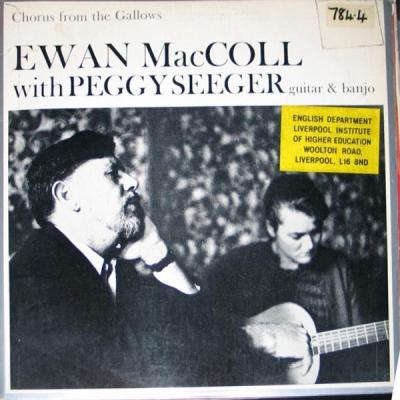
[19° secolo]
Una ballata irlandese ottocentesca che Ewan MacColl imparò da Harry Cox negli anni 50
Poi nei suoi album "Bad Lads and Hard Cases - British Ballads of Crime and Criminals" (1957) e "Chorus From the Gallows" (1960), con Peggy Seeger
Una canzone tradizionale esistente in molteplici versioni, di cui la più famosa è forse quella dei Dubliners, risalente al 1967.
Il testo della versione di MacColl – insieme a molte altre – l'ho trovato sull'incommensurabile Mudcat Café
Una canzone che mi ha fatto venire subito in mente la scena dell'incontro tra Amsterdam (Leonardo DiCaprio) e la borseggiatrice Jenny (Cameron Diaz) in "Gangs of New York" di Martin Scorsese (2002), un film in cui, non a caso, la nascita di New York – e dell'America moderna - è descritta come una guerra feroce fra i Nativi, protestanti, e i Conigli Morti, cattolici, immigrati irlandesi.
Una ballata irlandese ottocentesca che Ewan MacColl imparò da Harry Cox negli anni 50
Poi nei suoi album "Bad Lads and Hard Cases - British Ballads of Crime and Criminals" (1957) e "Chorus From the Gallows" (1960), con Peggy Seeger
Una canzone tradizionale esistente in molteplici versioni, di cui la più famosa è forse quella dei Dubliners, risalente al 1967.
Il testo della versione di MacColl – insieme a molte altre – l'ho trovato sull'incommensurabile Mudcat Café
Una canzone che mi ha fatto venire subito in mente la scena dell'incontro tra Amsterdam (Leonardo DiCaprio) e la borseggiatrice Jenny (Cameron Diaz) in "Gangs of New York" di Martin Scorsese (2002), un film in cui, non a caso, la nascita di New York – e dell'America moderna - è descritta come una guerra feroce fra i Nativi, protestanti, e i Conigli Morti, cattolici, immigrati irlandesi.
In a neat little town they call Belfast
(Continues)
(Continues)
Contributed by Bernart Bartleby 2018/3/20 - 21:45
Schooldays Over, Come on Then John
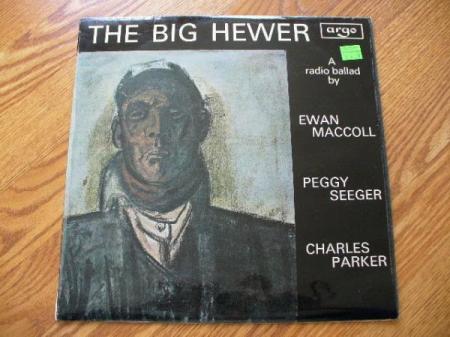
[1960]
Parole di Ewan MacColl
Musica di Ewan MacColl e Peggy Seeger
In "The Big Hewer - A Radio Ballad About Britain's Coal Miners", trasmissione radiofonica in onda nel 1960 sulla BBC Radio, prodotta da Charles Parker (1919-1980), scrittore, cantante ed attore teatrale. Il disco è del 1967, poi riedito nel 1999.
Si tratta della quarta di otto emissioni curate da MacColl e dalla Seeger tra il 1957 ed il 1964.
La coppia si avvalse della collaborazione di artisti prestigiosi, come Dave Swarbrick, A. L. Lloyd, Ian Campbell, Isla Cameron e Louis Killen.
Interpreta da molti, tra cui i Dubliners, i Chieftains, Dick Gaughan, Damien Dempsey, i Clancy Brothers,...
Pitman e collier sono entrambi sinonimi di miner, tre modi diversi che l'inglese ha per indicare il minatore del carbone...
Parole di Ewan MacColl
Musica di Ewan MacColl e Peggy Seeger
In "The Big Hewer - A Radio Ballad About Britain's Coal Miners", trasmissione radiofonica in onda nel 1960 sulla BBC Radio, prodotta da Charles Parker (1919-1980), scrittore, cantante ed attore teatrale. Il disco è del 1967, poi riedito nel 1999.
Si tratta della quarta di otto emissioni curate da MacColl e dalla Seeger tra il 1957 ed il 1964.
La coppia si avvalse della collaborazione di artisti prestigiosi, come Dave Swarbrick, A. L. Lloyd, Ian Campbell, Isla Cameron e Louis Killen.
Interpreta da molti, tra cui i Dubliners, i Chieftains, Dick Gaughan, Damien Dempsey, i Clancy Brothers,...
Pitman e collier sono entrambi sinonimi di miner, tre modi diversi che l'inglese ha per indicare il minatore del carbone...
Schooldays over, come on then John
(Continues)
(Continues)
Contributed by Bernart Bartleby 2018/1/29 - 21:42
Song Itineraries:
Child Abuse, The War of Labour: Emigration, Immigration, Exploitation, Slavery
Maid on the Shore
Anonymous
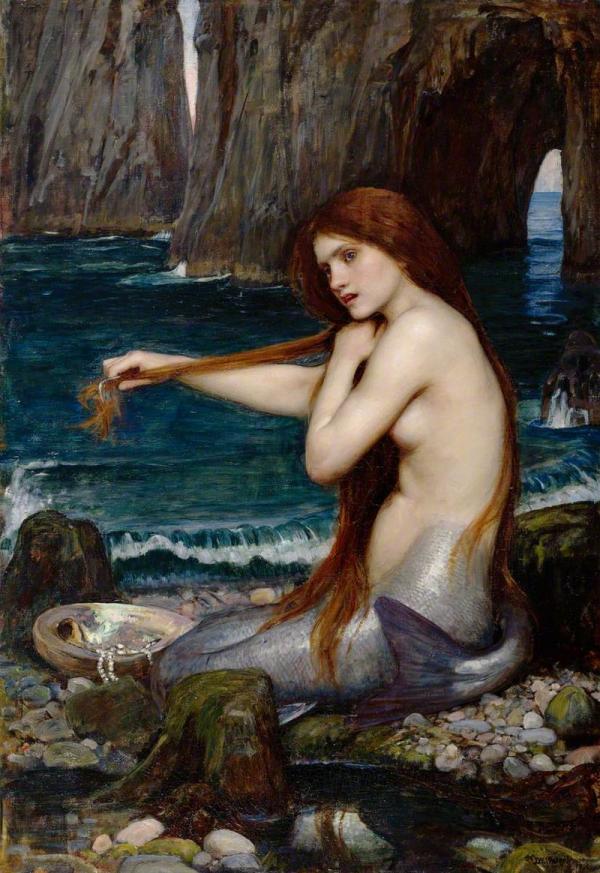
[prima metà dell'800, ma forse ben più antica]
Quello che riporto è il testo della versione della grandissima Frankie Armstrong, dal suo "Lovely on the Water" del 1972, di una delle canzoni tradizionali inglesi più femministe di sempre, al pari di The Crafty Maid's Policy, Lady Maisry, Wreccan wifes ged [The Wife's Lament; The Wife's Complaint] e altre già presenti sul sito.
"Maid on the Shore", o "The Mermaid", è stata incisa anche da A.L. Lloyd, Peggy Seeger, Martin Carthy, Stan Rogers, Cyril Tawney e molti altri artisti
Testo trovato su Mainly Norfolk: English Folk and Other Good Music
Anche questo un bel racconto di riscossa e vendetta femminile contro la meschinità e la brutalità maschili. La ragazza sulla spiaggia – quasi certamente una sirena – accetta docilmente di essere trasportata a bordo della nave di un grezzo capitano, uno che mastica e sputa tabacco e che la saluta senza... (Continues)
Quello che riporto è il testo della versione della grandissima Frankie Armstrong, dal suo "Lovely on the Water" del 1972, di una delle canzoni tradizionali inglesi più femministe di sempre, al pari di The Crafty Maid's Policy, Lady Maisry, Wreccan wifes ged [The Wife's Lament; The Wife's Complaint] e altre già presenti sul sito.
"Maid on the Shore", o "The Mermaid", è stata incisa anche da A.L. Lloyd, Peggy Seeger, Martin Carthy, Stan Rogers, Cyril Tawney e molti altri artisti
Testo trovato su Mainly Norfolk: English Folk and Other Good Music
Anche questo un bel racconto di riscossa e vendetta femminile contro la meschinità e la brutalità maschili. La ragazza sulla spiaggia – quasi certamente una sirena – accetta docilmente di essere trasportata a bordo della nave di un grezzo capitano, uno che mastica e sputa tabacco e che la saluta senza... (Continues)
Well it's of a sea captain who sailed the salt sea
(Continues)
(Continues)
Contributed by Bernart Bartleby 2017/12/30 - 23:43
The Meeting At Peterloo
Anonymous
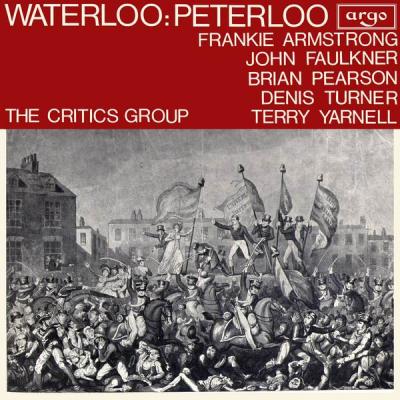
Anche nell’album del 1968 intitolato “Waterloo-Peterloo”, realizzato da The Critics Group, sotto la direzione di Ewan MacColl e Peggy Seeger
Bernart Bartleby 2017/12/12 - 13:32
Adieu, Farewell Earth's Bliss
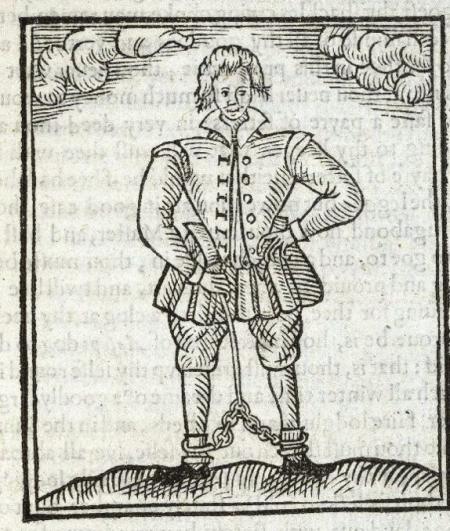
[1592-93]
Versi del poeta elisabettiano Thomas Nashe (1567–1601), nella sua opera teatrale “Summer's Last Will and Testament”, pubblicata nel 1600.
Con il titolo “In Time of Pestilence” nell’antologia “The Oxford Book of English Verse: 1250–1900”, a cura di Arthur Quiller-Couch, 1919.
Nel 14° volume della raccolta di AA.VV. intitolata “Poetry and Song”, pubblicata nel 1967 da
James Gibson con la MacMillan and Co. Ltd. I curatori erano Ewan MacColl e Peggy Seeger.
A proposito de 'A livella…
William 'Will' Sommers (o Somers, morto nel 1560), protagonista dell’opera di Nashe da cui sono tratti questi famosi versi, era il giullare del re Enrico VIII.
Diversi studiosi sostengono che buona parte della trilogia di William Shakespeare dedicata ad Enrico VI potrebbe essere stata scritta in realtà da Thomas Nashe.
Nell’iconografia dell’epoca, Thomas Nashe viene spesso rappresentato in catene perché la sua attitudine alla satira verso i potenti gli causò alcuni imprigionamenti.
Versi del poeta elisabettiano Thomas Nashe (1567–1601), nella sua opera teatrale “Summer's Last Will and Testament”, pubblicata nel 1600.
Con il titolo “In Time of Pestilence” nell’antologia “The Oxford Book of English Verse: 1250–1900”, a cura di Arthur Quiller-Couch, 1919.
Nel 14° volume della raccolta di AA.VV. intitolata “Poetry and Song”, pubblicata nel 1967 da
James Gibson con la MacMillan and Co. Ltd. I curatori erano Ewan MacColl e Peggy Seeger.
A proposito de 'A livella…
William 'Will' Sommers (o Somers, morto nel 1560), protagonista dell’opera di Nashe da cui sono tratti questi famosi versi, era il giullare del re Enrico VIII.
Diversi studiosi sostengono che buona parte della trilogia di William Shakespeare dedicata ad Enrico VI potrebbe essere stata scritta in realtà da Thomas Nashe.
Nell’iconografia dell’epoca, Thomas Nashe viene spesso rappresentato in catene perché la sua attitudine alla satira verso i potenti gli causò alcuni imprigionamenti.
Adieu, farewell earth's bliss!
(Continues)
(Continues)
Contributed by Bernart Bartleby 2017/12/11 - 15:58
Song Itineraries:
From olden times: Songs against war, inside war, around war
×
![]()

Parole e musica di Elizabeth "Libba" Cotten (1893-1987), afroamericana, chitarrista blues e folk, originaria del North Carolina.
Questa è una di quelle canzoni che mi piacciono tanto, non solo perchè è uno splendido standard della musica popolare americana, interpretato da molti artisti anche famosi, ma perchè ha dietro una storia di persone dalle vite modeste eppure incredibili, fantasmi, che sono apparsi, scomparsi, riapparsi, spariti di nuovo. Dimenticati, celebrati, scordati nuovamente e poi riscoperti.
Il tema della canzone è uno dei più cari alla musica blues e folk americana, quello del treno merci a vapore, mezzo di trasporto e di fuga per tutti i diseredati, bianchi e neri, miseri hobo o schiavi fuggiaschi, dalla metà dell'800 fino al primo dopoguerra e alla Grande Depressione. Treno che, come il fiume, spesso diveniva metafora della Salvezza offerta da Dio all'uomo... (Continues)